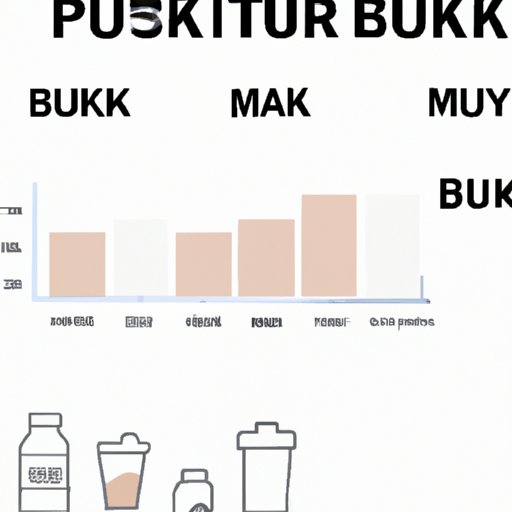Introduction
Bulking is the process of gaining weight and muscle mass. It is often used by bodybuilders and athletes who want to add more muscle mass and strength. The goal is to gain as much lean muscle as possible while minimizing fat gain. This can be done through dietary modifications, increased calorie intake, and regular resistance training.

Bulking Basics: What You Need to Know
When it comes to bulking, there are some basic principles that need to be understood in order to maximize your results. The most important things to consider are macro ratios, calorie intake, and timing of meals.
Macronutrient Ratios
Macronutrients are the building blocks of food and include proteins, carbohydrates, and fats. For bulking, you will want to focus on getting the right balance of these three macronutrients. A typical ratio for bulking is 40% protein, 40% carbs, and 20% fat. This ratio will ensure that your body has adequate fuel to build muscle without gaining too much fat.
Calorie Intake
In order to gain muscle, you will need to consume more calories than you burn. This means that you will need to increase your calorie intake in order to make sure your body has enough energy to build muscle. Generally speaking, you should aim to consume 10-15% more calories than you normally would in order to promote muscle growth.
Timing of Meals
Timing your meals is also important for bulking. Eating smaller, more frequent meals throughout the day can help keep your appetite in check and provide your body with a steady supply of nutrients. Eating every 3-4 hours is a good rule of thumb when it comes to bulking.
The Science Behind Bulking: How it Works
Now that you understand the basics of bulking, let’s take a look at the science behind it. There are three main factors that contribute to muscle growth during bulking: anabolic state, hormone balance, and insulin sensitivity.
Anabolic State
An anabolic state is when your body is in a state of muscle growth. To achieve this state, you must consume enough calories and protein to support muscle growth. This can be accomplished by increasing your calorie and protein intake and following a consistent workout routine.
Hormone Balance
Hormones play an important role in muscle growth. During bulking, your body needs to produce the right amount of hormones in order to optimize muscle growth. This can be done through proper nutrition and supplementation, as well as adequate rest and recovery.
Insulin Sensitivity
Insulin sensitivity is another key factor in muscle growth. Insulin is a hormone that helps regulate metabolism and can affect how quickly your body builds muscle. Eating a balanced diet and exercising regularly can help improve insulin sensitivity, which in turn can help optimize muscle growth.
Maximizing Muscle Growth with Bulking
Once you understand the science behind bulking, you can start to maximize your muscle growth. There are several strategies you can use to do this, including resistance training for hypertrophy, progressive overload, and rest and recovery.
Resistance Training for Hypertrophy
Resistance training is one of the best ways to build muscle. By focusing on compound movements such as squats, deadlifts, and presses, you can stimulate muscle growth. Make sure to vary your exercises and use progressive overload to challenge your muscles.
Progressive Overload
Progressive overload is the concept of gradually increasing the intensity of your workouts over time. This helps to stimulate muscle growth and prevent plateaus. Aim to increase the weight, reps, or sets of your exercises each week.
Rest and Recovery
Rest and recovery are essential for maximizing muscle growth. Make sure to get plenty of sleep and allow your body time to recover between workouts. This will help you stay energized and motivated, as well as reduce the risk of injury.

Bulking Diet Tips for Optimal Results
Diet is an essential part of bulking. Here are some tips to help you get the most out of your bulking diet:
Eating Enough Protein
Protein is the building block of muscle. Make sure you are getting enough protein in your diet to support muscle growth. Good sources of protein include lean meats, eggs, dairy products, nuts, and beans.
Choosing Healthy Fats
Fats are essential for overall health and can help you feel fuller longer. Choose healthy fats like olive oil, avocados, and nuts. Avoid trans fats and saturated fats as much as possible.
Eating Complex Carbs
Carbohydrates are an important source of energy for muscle growth. Choose complex carbs like oats, whole grains, and sweet potatoes instead of refined carbs like white bread and sugary snacks.

Strategies for Gaining Lean Mass During Bulking
If you are looking to gain lean mass during your bulking phase, there are several strategies you can use. These include intermittent fasting, carb cycling, and supplementation.
Intermittent Fasting
Intermittent fasting involves eating within a certain window of time each day. This can help you stay in a calorie deficit while still consuming enough calories to promote muscle growth. It can also help reduce hunger cravings and increase fat burning.
Carb Cycling
Carb cycling involves alternating days of high and low carb intake. This can help you maintain a calorie surplus while avoiding fat gain. It is important to make sure you are still getting enough protein and healthy fats in your diet.
Supplementation
Using supplements can help you reach your goals faster. Popular supplements for bulking include whey protein powder, creatine, and BCAAs. Make sure to do your research and talk to your doctor before taking any supplements.
Workout Routines to Maximize Bulking Progress
In addition to diet and supplementation, you will need to follow an effective workout routine to maximize your bulking progress. Here are some tips for creating an effective workout plan:
Compound Movements
Focus on compound movements such as squats, deadlifts, and presses. These exercises target multiple muscle groups at once and can help you build strength and size more efficiently.
Volume Training
Volume training involves doing higher reps and sets of exercises. This can help you pack on more muscle and increase your strength. Make sure to allow yourself enough rest and recovery between sets.
High-Intensity Interval Training
High-intensity interval training (HIIT) is a great way to burn fat and build muscle. It involves short bursts of intense exercise followed by periods of rest. HIIT can help you get stronger and leaner in less time than traditional cardio.

Common Mistakes to Avoid When Bulking
Bulking can be a tricky process and it is easy to make mistakes that can hinder your progress. Here are some common mistakes to avoid when bulking:
Overeating
It can be tempting to overeat when bulking, but this can lead to excess fat gain. Make sure to track your calorie intake and keep it within your target range.
Undereating
On the other hand, undereating can also be an issue. If you don’t consume enough calories, your body won’t have enough energy to build muscle. Make sure you are eating enough to support your goals.
Not Tracking Progress
Finally, make sure to track your progress. This can help you stay motivated and adjust your diet and workout plan if needed. Keep track of your weight, measurements, and strength gains to see what is working and what isn’t.
Conclusion
Bulking is an effective way to gain muscle mass and strength. By understanding the science behind it and following the tips outlined above, you can maximize your muscle growth and reach your goals. Remember to eat enough, train hard, and track your progress for the best results.
(Note: Is this article not meeting your expectations? Do you have knowledge or insights to share? Unlock new opportunities and expand your reach by joining our authors team. Click Registration to join us and share your expertise with our readers.)
